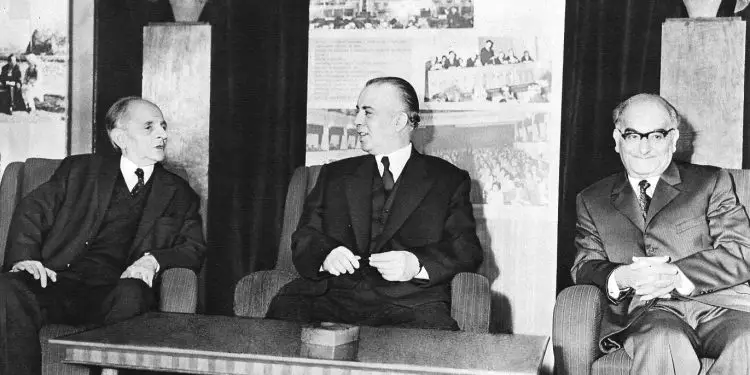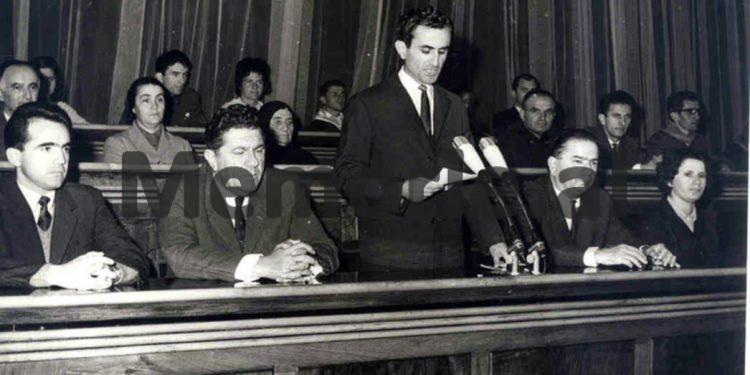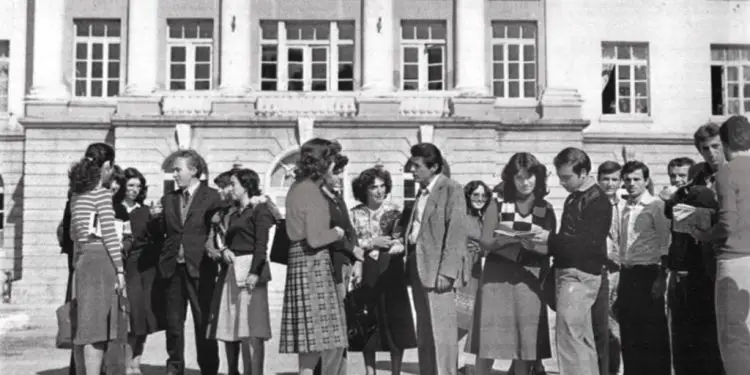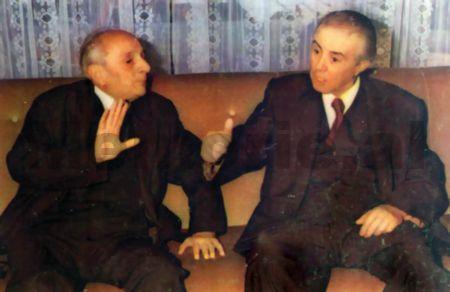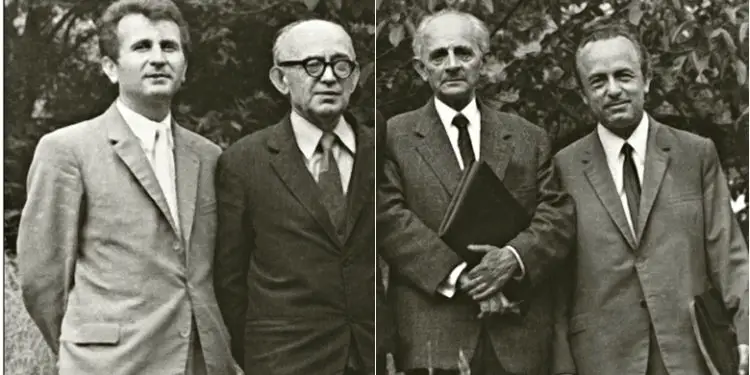By Zylyftar Hoxha
Memorie.al / “After 10 years of work in the Central Youth Committee, in February 1972, I transferred to the University as its Rector. Although the work at the University connected me again with the youth, I felt regret and pain that I left, not only because now I would no longer feel so young, but the main thing is that for all the years I worked with the youth, I gave for it, without saving, as much as I could from the youthful spirit and sincerity. But, I say with complete conviction, that I received and learned from my youth, much more than what I gave. I call it a privilege, which gives life to those people who, in one way or another, have to be and work in the midst of youth. I am happy that I had such a privilege in my life.
I’m talking a little about the first secretaries of the Central Youth Committee since its foundation in 1941 and up to me. There were a total of 8 people, and of these only Ramiz Alia was lucky enough to survive and climb the career ladder, up to the number one leader of the Party.
Here is the brief history of their lives: Qemal Stafa, killed in war by the Italian fascists, on May 5, 1942: His successor, Nako Spiru, falls victim to the intrigues of Enver Hoxha and commits suicide a few years later: Alqi Kondi dies accidentally: Liri Belishova, announced by Enver Hoxha, enemy of the party, punished and exiled:
Qamil Buxheli, charged for a short time as a youth organizer in the Central Committee, is punished and persecuted: Todi Lubonja is declared an enemy, exiled and imprisoned for 18 years in a row. After him, I was expelled from the Central Committee of the Party and from the party, and I was interned in Laç.
This is a passage excerpted from the book “Dreams and Disappointments”, by Agim Meros, former first secretary of the Central Committee of the Union of Labor Youth of Albania from 1962 to 1972. Based on this fragment, we continue the conversation with him.
Mr. Mero, can you tell us why this happened, well with the old, who had competitors, but what about the young?
For this fate of theirs, there are many “whys” that require answers, but, of course, one of the answers may be that Enver Hoxha, knowing their reputation in their youth, considered them as people who could bring worries and troubles and he expected their “flight” from the beginning. This was also a “Stalinist” simile, because this had also happened in the Soviet Union, with the first secretaries of youth.
You became rector at the University, why do you call this interruption “flight”?
I couldn’t understand, why was it thought that I should go to the University at that time?! Two things worried me the most: the first, that I was going as a leader to my former professors, and the second, that I didn’t have any scientific title or degree and I would feel close, among all those intellectuals, starting from those of the older generation, such as: Eqerem Çabej, Aleks Buda, Selman Riza, Shaban Demiraj, Karajani, Kol Popa, etc.
But when I showed this reservation to the Central Committee of the Party. they told me: “Don’t imagine the rector in our country with raso and veladon, like in other countries”! In these years, the University was also in the process of “revolutionization”.
How did you find the University?
At the time when I went there, the implementation of the “revolutionary triangle” had begun, but the cracks of difficulties, of material shortages, of the weak teaching base were felt, but above all, the low level of teaching was acute, under the slogan of introducing spirit of the working class and political guarantees in the University, were taken from the “base”, many incompetent and mediocre lecturers.
Following a speech by Enver Hoxha, on the quality of teaching work at the school, Ramiz Alia held a report with the University lecturers, where, among other things, he said: “The incompetent and mediocre have no place in the University, as mediocrity breeds mediocrity”.
With various methods, we started efforts to identify the disabled and to remove them from the University. The reaction was great and powerful, and their departure took the form of a real war, not to mention an adventure from us. One day, one of the famous professors Androkli Kostallari came to see me and said; “If it is possible to get the disabled to leave the University, this will be, after the establishment of the University itself, the biggest victory and event”.
“Be careful and keep in mind – he continued – in the University, the disabled make up the majority and there is a risk that the capable will leave instead of them”. And, if it didn’t happen exactly like that, very few incompetents left, who returned after 2-3 years, while not less than that, capable ones also left, who I don’t know if they ever returned to the University, after the internship of “tempering”, based.
During the time you were rector, were there also major events in science and our national culture?
It’s true. In the autumn of 1972, two scientific events of national importance were organized by the University: the First Assembly of Illyrian Studies, in September; and the Spelling Congress, in November. Prominent historians and linguists from the country, from Kosovo and from many other countries of the world, pointed out, in these two historical gatherings, the ancient culture and its Illyrian origin of history and the Albanian language, as one of the most old of the continent.
The reports and speeches of Androkli Kostallari, Aleks Buda, Eqerem Çabej, Idriz Ajeti, etc., were the strong scientific basis, where the conclusions and decisions of the Assembly and the Congress were supported. Like the Assembly, but especially the Spelling Congress, Enver Hoxha followed them with special care. He asked and listened especially attentively to the opinions of Kosovar scholars about the unified language and especially appreciated the opinions of Çabej about the convergent character of the Albanian literary language.
What do you remember from Spelling Bee?
I have a detail from that event. When the congress closed, Enver Hoxha met in turn the scientists and linguists who gave the reports and speeches and sat down to drink coffee, between Eqerem Çabej and Alex Buda. There he declared that the Academy of Sciences would soon be established, evaluating in this case the scientific abilities of both Çabe and Buda. This caused the intellectual opinion to discuss that one of these two would be the next president of the academy. Two months later, when the Academy was inaugurated, Enver Hoxha considered its president, Prof. Alex Budden.
Both Çabej and Buda, both of the Austrian school, had their own “spots” in their biographies, of which Enver Hoxha called Alex Buda’s as the smallest. When Enver Hoxha called Alex Buda to communicate the decision about this, I don’t know how true it is, Alex Buda, with his wit and characteristic smile, told him: “- Comrade Enver, this is the first big mistake what the Party is doing, by appointing me the president of the Academy of Sciences of Albania”.
Aleks Buda was a well-educated, erudite intellectual with Western culture. Then the action of Enver Hoxha, to appoint him as the president of the academy, was considered as a signal that was done in accordance with the liberal spirit of that period, which gave hope for positive changes. Above all, in these activities, the figure of Eqrem Çabej stood out, first of all as a great linguist, but no less as such a historian, with polyhedral dimensions.
Any other details?
During the break, after the first session of the Spelling Congress, where Prof. Androkli Kostallari, who was at that time the Director of the Institute of Linguistics, Enver Hoxha asked him whose quote about language, with which Androkli closed the report, was from. Androklius found himself a little embarrassed, because he knew very well whose words they were, but at the same time he suspected that Enver Hoxha himself might know, and shyly said that he had taken those words from a headline article in the newspaper “Albania”, which was published in Brussels.
“For sure – said Enver Hoxha – Konica will have told him. He said it well.” Faik Konica’s quote was: “We foresee, at the dawn of tomorrow, a flourishing and intellectual Albania, where a youth thirsty for knowledge, devoted to art, beauty and work will live. These young Albanians will judge with a merciful justice our efforts, grafted with failures, slowness and incompetence, but full of fiery openness. They will examine with all the means of documentation and criticism, what was our language yesterday and what will be their language tomorrow, the language in which they will express their thoughts or their dreams . To this tongue full of muscles, sweetness and sharpness, they will ask for the date of birth and know how to determine it”.
Agim Mero: TWO UNNECESSARY CORNERS OF THE “REVOLUTIONARY SCHOOL TRIANGLE”
Excerpts from the book ‘Dreams and Disappointments’ –
In the framework of the revolutionization of the country’s life, the “revolutionization of the school” had begun in us, having as a leitmotif the order of Enver Hoxha: “For the Marxist-Leninist ideological axis”. Regarding this, discussions were held and some of the strangest measures and initiatives were taken. Until it was concluded that the whole life and activity of the school should be summed up in the “revolutionary triangle”: “Learning, Work, Military Training”.
The soundest part of the teaching body and the intelligentsia insisted, without openly contradicting the other two corners of that triangle, that the basis of the school should be learning, the benefit of knowledge. And this was a victory of the test that our school gave, that with dignity our pupils and students have been measured even with the prestigious schools of many other countries. Under the banner of general interest above all, initiatives were taken to abolish royalties, to abolish stair cleaners, to do the work for the residents themselves.
In the neighborhood, the activists of the front checked for television antennas and, in public meetings, those who were suspected of watching foreign television stations were unmasked. Talking about this, one day Dritreoi told us: “I am now afraid of two things, the newspaper ‘Bashkimi’ and the neighborhood”. Because the newspaper “Bashkimi” encouraged the removal of royalties and that in the neighborhood they had criticized him for not coming out to clean the stairs of the building where he lived.
LITERATURE WITHOUT LOVE, HOW DOES IT GO WITHOUT…!
At this time, the Central Youth Committee and the Association of Writers and Artists of Albania organized a meeting with young literary talents. I was next to Ismail Kadare and Dritëro Agolli, and we listened attentively to the discussions of young writers. We were impressed that none of them spoke about the theme of love in their work, as if they were old men or ascetic people. Of course, this could not be believed, but they were confirmed with time and were afraid to touch this topic. Ismaili told us both with regret and with bitter humor: – “Generations to come, when they read the works of this generation, will say that these people were once cornered”.
“While the critics – added Dritëroi – will discover that in the heart of socialist realism, there was also a special current of ‘qoseism'”. The only organ for young people, where they published their creations, was the “Voice of Youth” literary page.
The courageous collective of this newspaper, where writers and poets known as; Jakov Xoxe, Fatos Arapi, Agim Cerga, Vath Koreshi, Loni Papa, skilled journalists such as Luan Dibra, Liri Lubonja, Mr. Gurakuqi, and collaborators, from Ismail Kadareja, to Bedri Dedja and Nasho Jorgaqi, Aleko Minga, Petrit Mina Naqe’s spark always opened windows for young people.
Ismail Kadarea published his first poems and stories in that newspaper. Even then, when other bodies did not publish any of his creations, he found a place on the pages of “Zeri te Rinia”, as happened with the story “Nudo”, etc. Bilal Xhaferi and his poems, Trifon Xhagjika, published “Çame ballad”. Memorie.al




